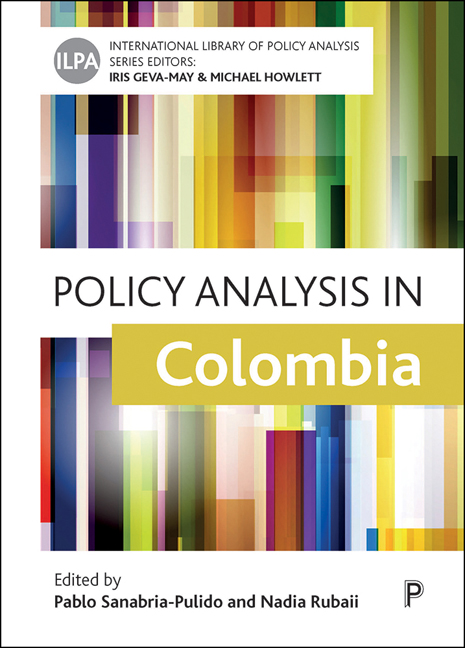Book contents
- Frontmatter
- Dedication
- Contents
- List of Figures and Tables
- List of Abbreviations
- Notes on Contributors
- Editors’ Introduction to the Series
- Policy Analysis in Colombia: An Introduction
- Part One Policy Analysis in Contemporary Colombia
- One The policy Analysis Movement in Colombia: The State of the Art
- Two Evolution of Policy Analysis as a Field of Study and Instruction in Colombia
- Three Policy Analysis, Bureaucratic Capacity and Public Administration Reforms in Colombia
- Part Two Policy Analysis within National and Subnational Governments
- Four Policy Analysis Inside Central Government in Colombia
- Five Policy Analysis and the Legislature in Colombia
- Six Policy Analysis in the Colombian Constitutional Court
- Seven Metropolitan Governance and Policy Analysis in Colombia
- Eight Policy Analysis for Decision Making in Colombian Local Governments
- Part Three Policy Analysis in Key Policy Domains
- Nine Policy Analysis in the Education Sector in Colombia
- Ten Policy Analysis in the Health Sector in Colombia
- Eleven Policy Analysis and Decision Making in the Military Forces: The Havana Experience
- Twelve Technocracy, Decision Making and Economic Policy in Colombia
- Thirteen Social Policy, Target Populations and Policy Analysis in Colombia
- Part Four Policy Analysis Beyond the State
- Fourteen Political Parties and Policy Analysis in Colombia
- Fifteen Policy Analysis and NGOs in Colombia
- Sixteen Media, Evidence and Policy Analysis in Colombia
- Conclusion: Building Capacity for Policy Analysis Amid Tensions and Challenges in Colombia
- Index
Thirteen - Social Policy, Target Populations and Policy Analysis in Colombia
Published online by Cambridge University Press: 10 March 2021
- Frontmatter
- Dedication
- Contents
- List of Figures and Tables
- List of Abbreviations
- Notes on Contributors
- Editors’ Introduction to the Series
- Policy Analysis in Colombia: An Introduction
- Part One Policy Analysis in Contemporary Colombia
- One The policy Analysis Movement in Colombia: The State of the Art
- Two Evolution of Policy Analysis as a Field of Study and Instruction in Colombia
- Three Policy Analysis, Bureaucratic Capacity and Public Administration Reforms in Colombia
- Part Two Policy Analysis within National and Subnational Governments
- Four Policy Analysis Inside Central Government in Colombia
- Five Policy Analysis and the Legislature in Colombia
- Six Policy Analysis in the Colombian Constitutional Court
- Seven Metropolitan Governance and Policy Analysis in Colombia
- Eight Policy Analysis for Decision Making in Colombian Local Governments
- Part Three Policy Analysis in Key Policy Domains
- Nine Policy Analysis in the Education Sector in Colombia
- Ten Policy Analysis in the Health Sector in Colombia
- Eleven Policy Analysis and Decision Making in the Military Forces: The Havana Experience
- Twelve Technocracy, Decision Making and Economic Policy in Colombia
- Thirteen Social Policy, Target Populations and Policy Analysis in Colombia
- Part Four Policy Analysis Beyond the State
- Fourteen Political Parties and Policy Analysis in Colombia
- Fifteen Policy Analysis and NGOs in Colombia
- Sixteen Media, Evidence and Policy Analysis in Colombia
- Conclusion: Building Capacity for Policy Analysis Amid Tensions and Challenges in Colombia
- Index
Summary
Introduction
In Colombia, in the 30 years that have passed since the constitutional change of 1991, a very high proportion of Colombians have gained access to policies such as health, primary and secondary education, and basic services. Moreover, over the past three decades of state growth, redistributive (equality) and identity (diversity) policies have become part of the government's agenda. In this context, the needs of an ever-increasing list of populations (young people, elderly people, people with disabilities, indigenous communities, Afro-descendants, victims of armed conflict and so on) began to be addressed through expanding target population-based policies. In policy studies terms, the Colombian state expanded its basic welfare and its policy targeting, as a substitute to a welfare state with universal coverage.
The increase of basic welfare policies and policy targeting helped to reduce the rate of poverty and to improve the quality of life to many millions of people, particularly so in large Colombian cities. However, the results of these policies have been very marginal in terms of the general reduction of income inequality. For example, in the context of Latin American states, the case of Colombia seems one of the most serious in terms of the lack of impact of income redistribution of fiscal and social policy. This implies that the one of the most pressing policy questions in Colombia is why, after such an important institutional change (a completely new Constitution) that doubled the size of the state, so little has changed terms of income distribution.
Addressing this puzzle, this chapter suggests that this can be explained through the concept of the truncated state (Holland, 2013). This notion refers to welfare regimes in countries where the construction of social security systems reflects the pre-existing social stratification and the capacity of powerful pressure groups to create their own protection schemes. This chapter suggests that one possible explanation for this “truncated” type of social policy that exists in Colombia could be the limited political power and representation (in Congress, the judiciary and the executive) of the marginalized populations that have been targeted.
All in all, this chapter has three main sections. The first section introduces the general changes to social policies, first looking into the expansion of basic welfare and then exploring the evolution of policy targeting.
- Type
- Chapter
- Information
- Policy Analysis in Colombia , pp. 223 - 238Publisher: Bristol University PressPrint publication year: 2020



